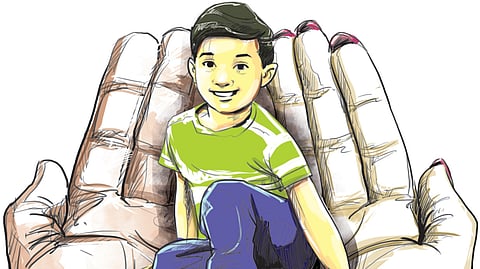

THIRUVANANTHAPURAM : Gone are the days when orphanages and care homes were the go-to options for children without a family. In a significant shift, society has evolved enough to understand that every child needs the chance to grow up in a loving, family setting. Enter foster care.
“It’s not a short-term commitment that merely provides a temporary home, rather about creating lasting bonds,” says Anusha Andrews, a foster caregiver.
She is part of over two hundred foster families in the state.
“It’s the same for many families. We need these children just as much as they need us. We took a long-term contract. Otherwise, it is difficult for all of us. Children fear uncertainty. We need to assure them that we won’t let them go,” she stresses.
Foster care is like the superhero of childcare; swooping in to provide a safe, clean and stable environment, making sure no child feels left out. Often serving as a springboard to a better life, fostering also helps some children become part of a family forever through adoption.
In Kerala, the State Child Protection Society -- functioning under the department of women and child development -- is tasked with arranging foster care. The District Child Protection Unit works as the district-level nodal authority for the same. Kerala stands ahead of other states in providing a familial environment to children. With 245 children currently in foster care, the system followed by the state provides options like vacation, kinship and group fostering.
For children aged 6-18, foster care offers a taste of family life before they find their forever homes. Short-term fostering, typically lasting less than a year, allows for adaptability checks, ensuring both the child and the family thrive together. And with recent amendments allowing for adoption after just two years of foster care, the potential for permanency brings hope to both children and families. Kinship fostering adds another layer of familiarity, as children are taken up by relatives or close family friends who become their official foster carers. This not only offers socioeconomic familiarity for the children but allows for financial aid from the welfare department to support the caregivers.
Vacation foster care, a newer initiative, allows children to experience family life during holidays, attending family functions and engaging with peers outside their usual circles. Officials visiting homes once every month serves to ensure the safety and well-being of the children.
“It isn’t ideal for children to grow up in institutions. Fostering helps children develop life skills and enables social interactions beyond their peer groups,” says an official with the women and child development department, who doesn’t want to be named. Group fostering provides another alternative, with up to eight children living in a home-like setting under the care of trained caregivers.
“While the turnout of foster families may not be overwhelming, awareness is growing, particularly after the Covid pandemic. We used to send children to extended families in case of emergencies. That has now changed, with other families stepping up for the cause -- a positive change. A foster parent has to be in the age-group of 35 to 65,” the official says.
The State Adoption Regulation Agency facilitates adoption of children who have completed two years in foster care. “Mostly middle-class families step up, with single-child households often embracing foster care during vacations. A financial support of Rs 2,000 per month throughout the fostering period is provided, although each case is carefully assessed by the sponsorship and foster care approval committee,” the official points out.
Proper preparation -- including interviews and home studies -- helps equip foster parents with the knowledge to handle the emotional and physical needs of their wards. “I received the approval to foster two brothers in December 2021. It’s been almost two and a half years now, and we’ve become a family. The authorities conduct home studies and interviews. I was interviewed the most to make sure I was comfortable with the decision, being the child in my family,” adds Anusha, who serves as a foster sister.